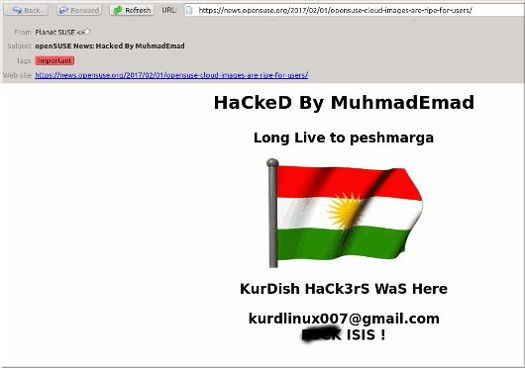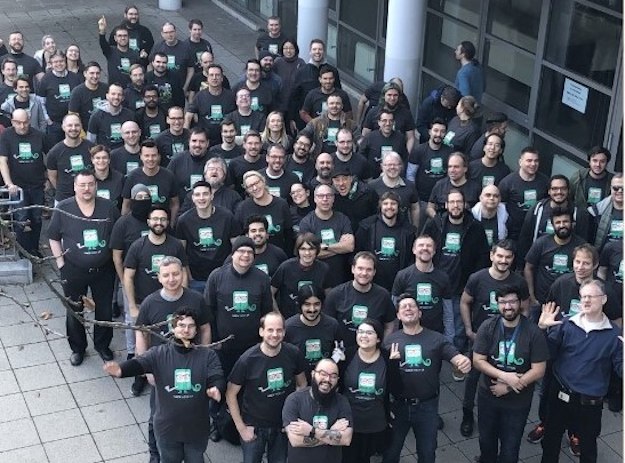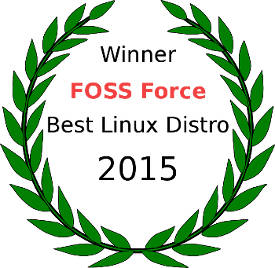Although several news outlets have reported that SUSE Liberty Linux is a new RHEL-based distribution, it's actually a support program for organizations running multiple Linux flavors.
Posts tagged as “suse”
Actually, FOSS Force had nothing whatsoever to do with SUSE pulling the video, but the headline piqued your interest, didn’t it?

The Every-Other-Monday Column
Sometimes the best laid plans…
A week ago Sunday I wrote and scheduled an article to be published last Tuesday. In it, I poked fun a little fun at SUSE, while giving a thumbs up to what I thought was a very well executed — and funny — parody of “Game of Thrones.” It was also very clever, insofar as it managed to paint rival Red Hat in a less-than-open light, without ever mentioning the company by name. In the parody, the not-so-open guys all wore red hats.
Christine Hall has been a journalist since 1971. In 2001, she began writing a weekly consumer computer column and started covering Linux and FOSS in 2002 after making the switch to GNU/Linux. Follow her on Twitter: @BrideOfLinux
Watching this video from SUSE, you might be excused for thinking you’re watching a trailer for a new Netflix original which looks suspiciously like “Game of Thrones.” To paraphrase an old Dodge commercial: “You can tell they’re bad guys because they all wear Red Hats.”

Okay, it’s a funny little five minute parody of House of Thrones. But it looks to me as if SUSE has thrown down the gauntlet and is challenging Red Hat…or a bunch of medieval guys wearing red hats…to who knows what. Are the gals and guys in Germany growing a little tired of being the perennial second fiddle — or now third fiddle now that Ubuntu is in server rooms everywhere, especially in Amazon’s cloud.
Christine Hall has been a journalist since 1971. In 2001, she began writing a weekly consumer computer column and started covering Linux and FOSS in 2002 after making the switch to GNU/Linux. Follow her on Twitter: @BrideOfLinux
No matter what you might have heard or read, it appears as if last week’s defacement of openSUSE’s news site didn’t affect download images of either openSUSE or SLES.

There’s a good chance you’ve already heard the news that a week ago today the openSUSE News site was defaced with an anti-ISIS message by a Kurdish group. Yup, that happened and was quickly fixed. You might also have heard that the hack went much deeper and that openSUSE, perhaps even SUSE, might have hosted hacked versions of their distros with a newly added backdoor. Nope. All indications are this never happened.
Christine Hall has been a journalist since 1971. In 2001, she began writing a weekly consumer computer column and started covering Linux and FOSS in 2002 after making the switch to GNU/Linux. Follow her on Twitter: @BrideOfLinux





 Better Fedora laptop support on the way: Red Hat has made an announcement that should eventually have a positive effect throughout all Linux distros. Today we learned from
Better Fedora laptop support on the way: Red Hat has made an announcement that should eventually have a positive effect throughout all Linux distros. Today we learned from 

 Is Ubuntu the new Novell? It probably wasn’t news to anybody when Microsoft failed to renew it’s deal with SUSE when it expired at year’s end. Many with long memories will remember that way back when SCO was still a viable company, Microsoft inked a deal with Novell, which was then the proud new owner of the SUSE Linux distro. Among other things, the deal gave SUSE users a free pass against getting sued by Microsoft for infringing any of its patents. As part of the deal, Microsoft purchased tons and tons of SUSE support contracts to sell to enterprise customers who might need to keep a Linux machine or two running, which were reportedly given away. Mainly, Microsoft was using SUSE as its official Linux distro, and as a testing ground for Microsoft’s attempts to get Windows to work and play well with Linux.
Is Ubuntu the new Novell? It probably wasn’t news to anybody when Microsoft failed to renew it’s deal with SUSE when it expired at year’s end. Many with long memories will remember that way back when SCO was still a viable company, Microsoft inked a deal with Novell, which was then the proud new owner of the SUSE Linux distro. Among other things, the deal gave SUSE users a free pass against getting sued by Microsoft for infringing any of its patents. As part of the deal, Microsoft purchased tons and tons of SUSE support contracts to sell to enterprise customers who might need to keep a Linux machine or two running, which were reportedly given away. Mainly, Microsoft was using SUSE as its official Linux distro, and as a testing ground for Microsoft’s attempts to get Windows to work and play well with Linux.

 Linux Foundation looks to Open APIs: After corralling the widely divergent world of containers, the Linux Foundation now sets its sights on the API economy and making application program interfaces, or APIs, easier to find, according to a
Linux Foundation looks to Open APIs: After corralling the widely divergent world of containers, the Linux Foundation now sets its sights on the API economy and making application program interfaces, or APIs, easier to find, according to a